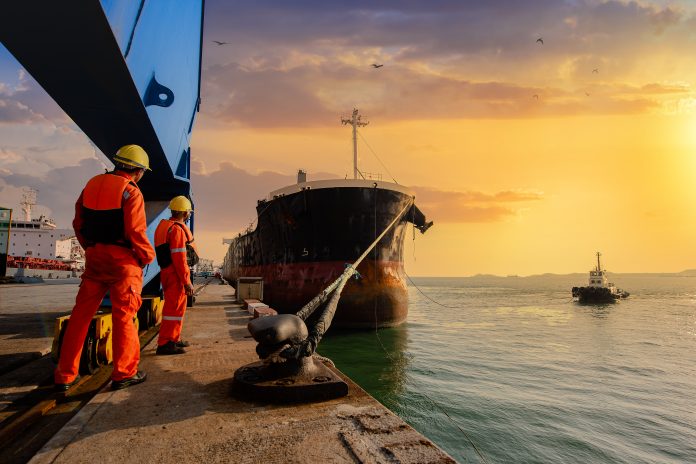Seafaring is one of the most dangerous professions due to its perils. Some go missing or die during maritime disasters or for unknown reasons.
“A job of a seafarer is not exactly a walk in the park,” says the Supreme Court in the case of Oriental Ship Mgt. vs. Bastol (G.R. No. 186289, June 29, 2010).
Wreathe and flower-throwing activities during the 27th National Seafarers’ Day (NSD) last Sunday, Sept. 25, 2022, were offered for the deceased seafarers and fishers, as well as for those who have perished or went missing at sea.
The flowers carry the message of love and gratitude as there is no distance of time or oceans but a mutual waiting for a reunion in peace.
The issue of disappearances of seafarers while on board a vessel was raised during the online hearing on the pending Magna Carta for Seafarers presided by Senator Raffy Tulfo.
Department of Migrant Workers Undersecretary Hans Cacdac said that more than 100 Filipino seafarers “suddenly” went missing in recent years leaving no clues for authorities to trace their whereabouts.
He said that majority of those who went missing belonged to lower ranks, such as cadets, able seamen, and ordinary seamen.
Cacdac said that in most instances there’s no proof or no footages due to the absence of CCTVs on board. No one has an idea, saying they just disappeared suddenly while fellow crew members also refused to cooperate.
He pointed out that the Philippine government has yet to conduct a thorough investigation on the disappearance of Filipino seafarers noting the country lacked jurisdiction over foreign vessels and international waters.
He said the figure does not include missing seafarers in reported sea accidents, like the ill-fated Gulf Livestock 1 that capsized in southwest Japan on September 2, 2020, during the typhoon Maysak that left 36 Filipino crew members lost at sea.
Locally, 18 persons remain missing after M/V Starlite Atlantic sank off Mindoro on Dec. 26, 2016, at the height of typhoon Nina, including 11 student cadets taking their on-the-job training.
Senator Risa Hontiveros, a co-author of the Magna Carta, said Filipino seafarers deserve better protections wherever they may be.
Hontiveros stressed that the Magna Carta seeks a comprehensive package of reforms to the legal framework regulating the maritime labor industry so the rights and welfare of seafarers are better protected before, during, and after deployment.
Most of the Holy Masses last Sunday held nationwide were offered for the seafarers and other migrant workers as part of the 27th NSD. The Boses ng Marino singing contest was also held along Kalaw Ave. in Manila.
The late former president Fidel V. Ramos issued Proclamations No. 828 (1996) and No.1094 (1997) declaring every last Sunday of September every year as NSD that aimed to give due recognition to the vital role of Filipino seafarers towards the development of the Philippines as a maritime country.
The Stella Maris was tasked to coordinate with the public and private sector in activities related to the celebration of the said event.
Stella Maris-Philippines Bishop Promoter Bishop Ruperto C. Santos of Balanga earlier said that the law is a historical legacy to all seafarers, their families, the welfare service providers and to the maritime world. He added that the law not only helped to raise awareness of the ‘blue economy’ but made everyone more aware of the sacrifices that seafarers go through.
This year’s theme is “#No shipping, No shopping: Salamat, Marinong Filipino!”
“As nearly over 90 percent of the goods in the world are transported by sea, we fail to recognize that without the seafarers, the products may not reach us,” according to Father Paulo Prigol, Stella Maris Manila chaplain.
Despite the COVID-19 pandemic, Father Prigol said that seafarers kept on sailing and manning the more than 50,000 ships around the world to transport our “orders.”
The first version of the Magna Carta was the by-product of the 2002 National Seafarers Conference at the Manila Hotel that was organized by the Stella Maris in coordination with the Office of Senator Ramon Magsaysay, Jr.
Years later, several versions were filed by legislators that considered legal developments both locally and internationally. This include the Maritime Labour Convention of 2006 (MLC 2006) also called the Seafarers’ Bill of Rights and the fourth pillar of international maritime law.)
The deployed Filipino seafarers in 2021 remitted US$6.545 billion per data from Bangko Sentral, which is higher than 2020’s remittance of US$6.353 billion. The sea-based sector’s remittance comprise at least 22 percent of the total dollar remittances of Overseas Filipino Workers (OFWs).
It is estimated that there is one Filipino seafarer for every four to five crew on board a vessel at any time.
Atty. Gorecho heads the seafarers’ division of the Sapalo Velez Bundang Bulilan law offices. For comments, e-mail [email protected], or call 0917-5025808 or 0908-8665786









